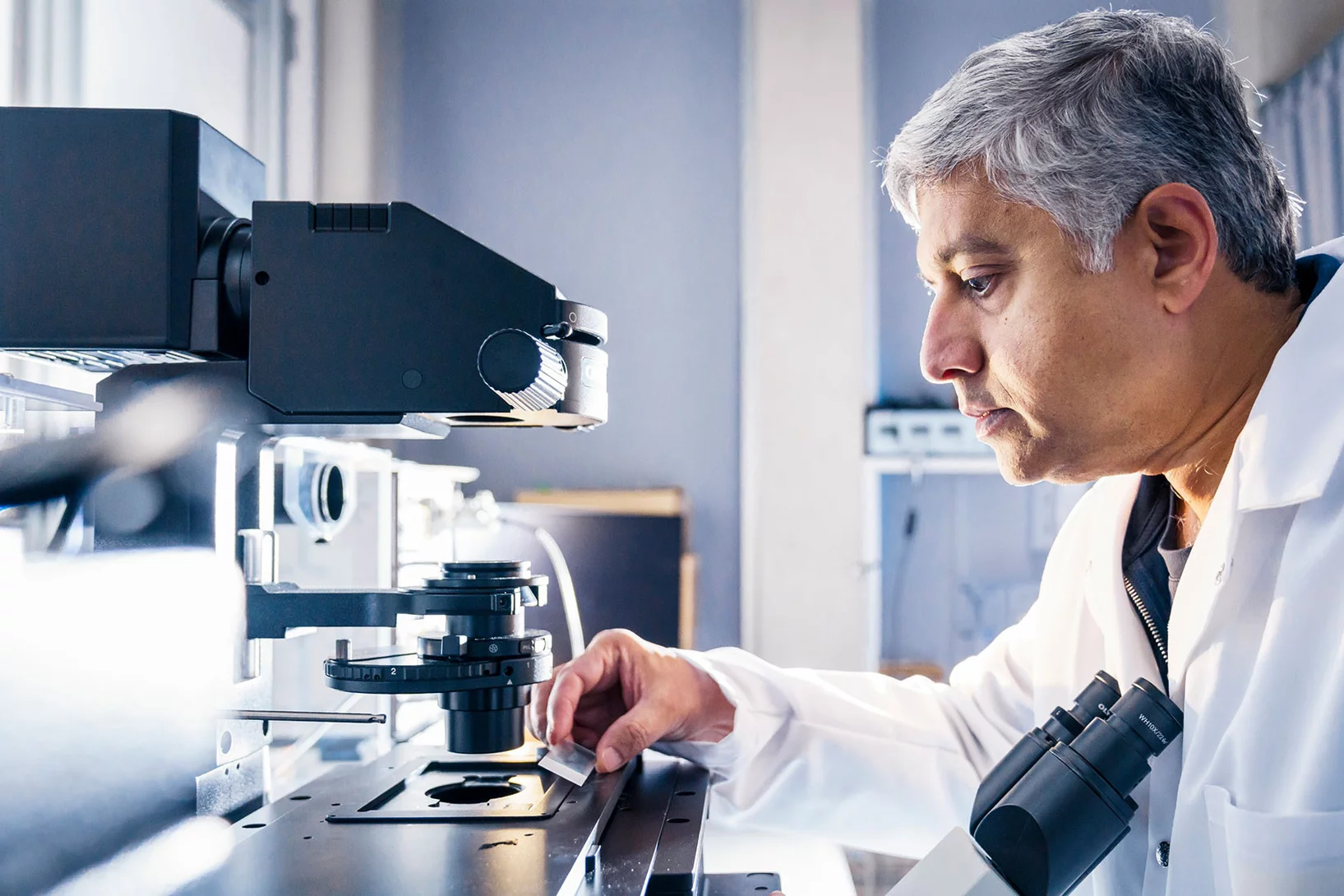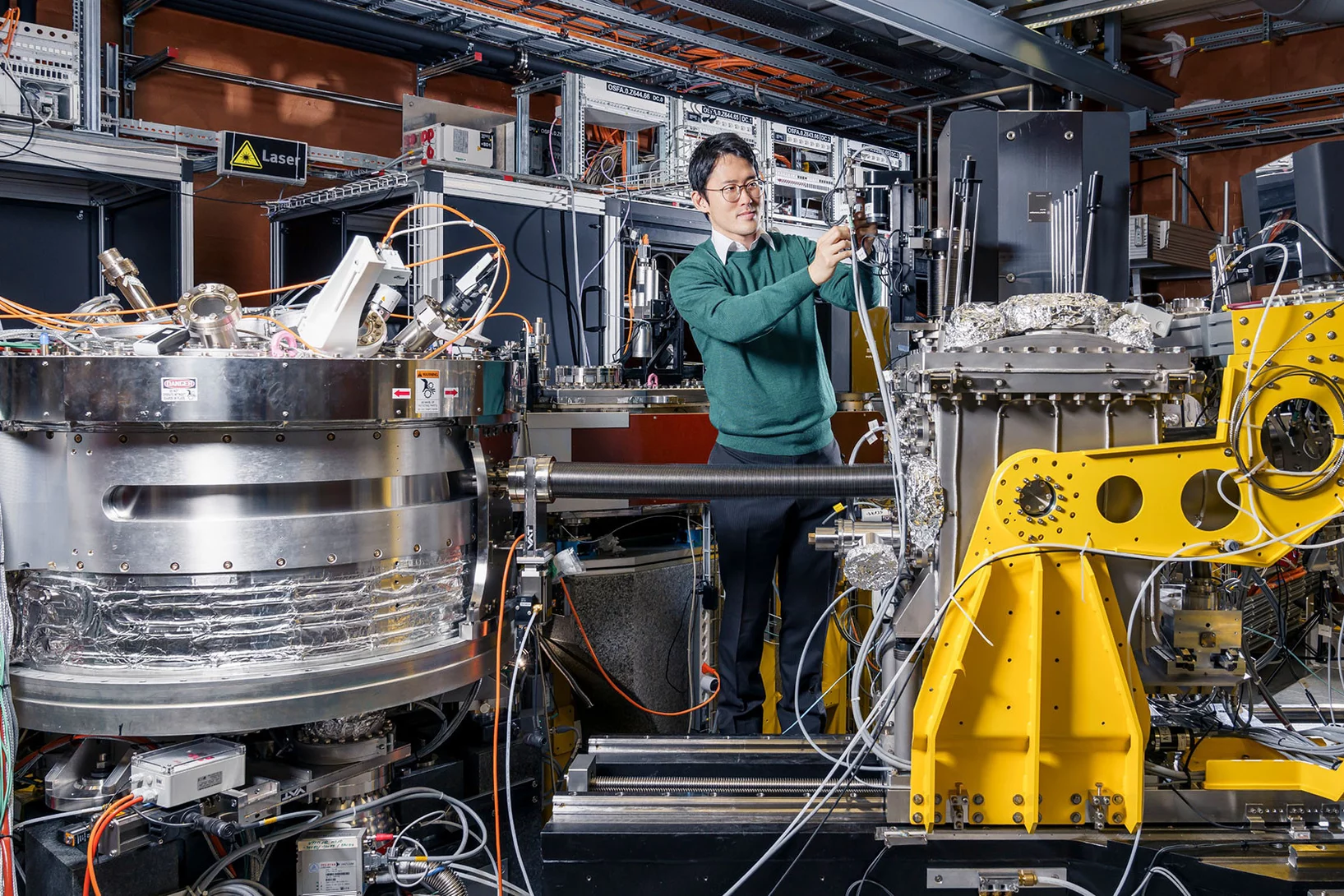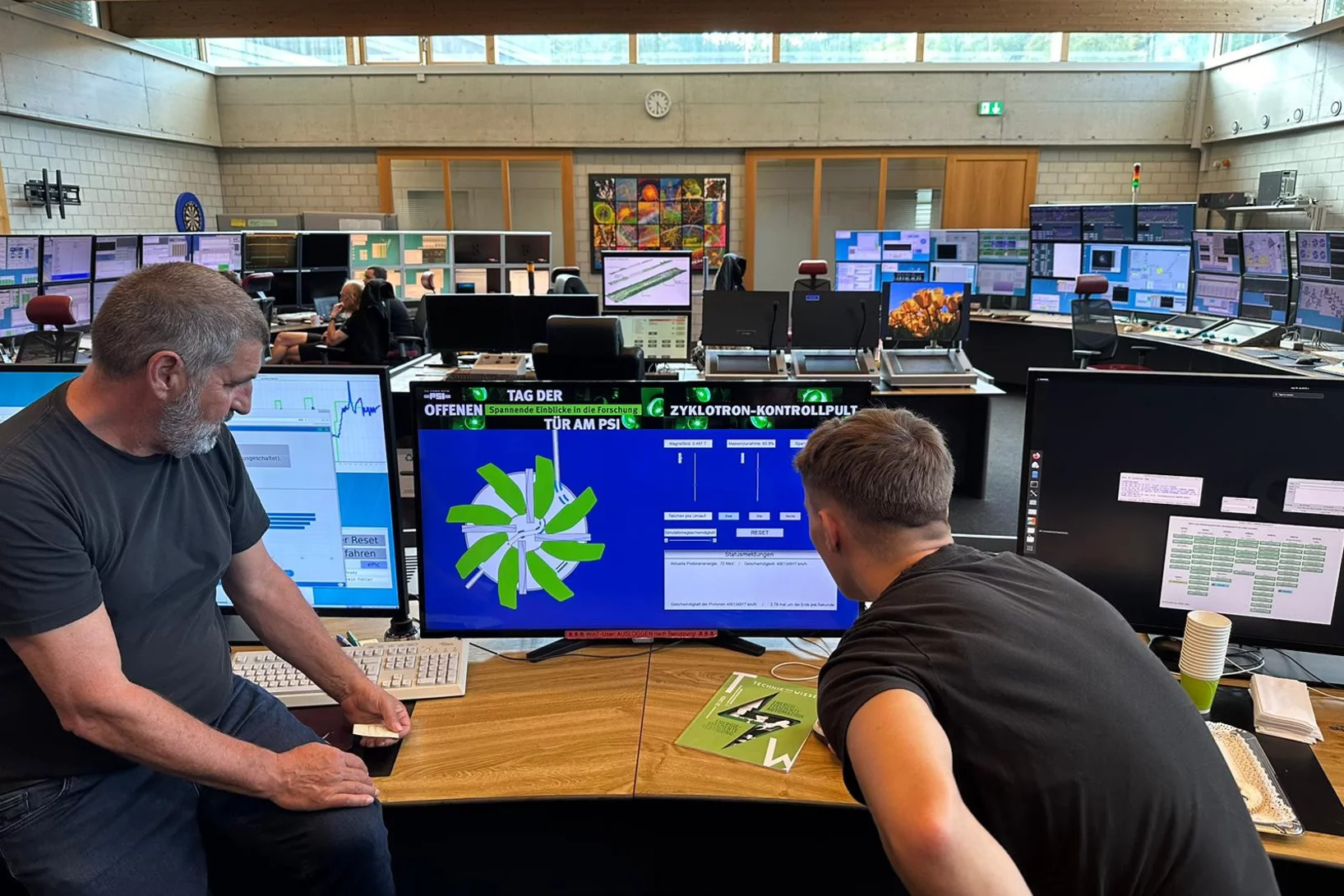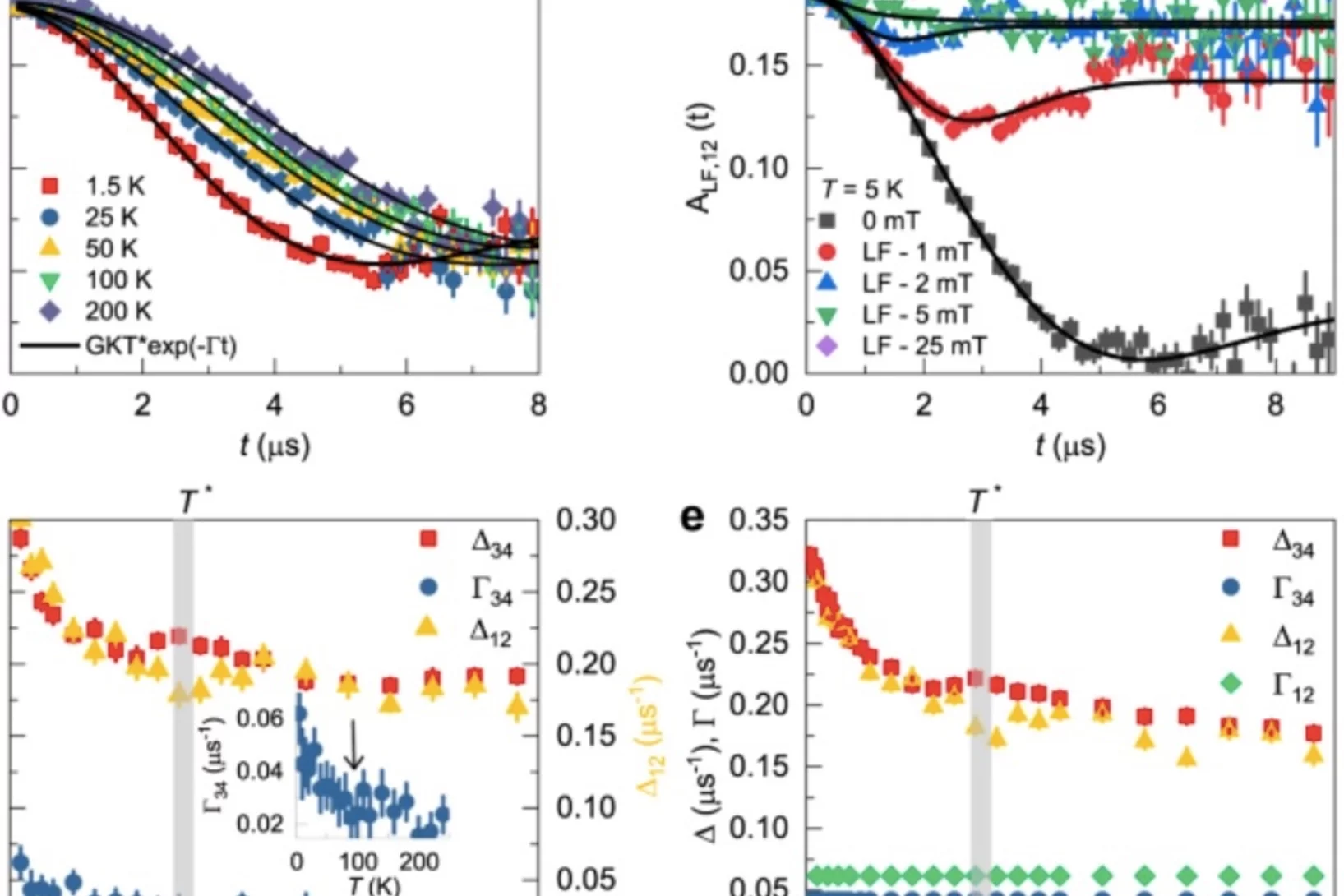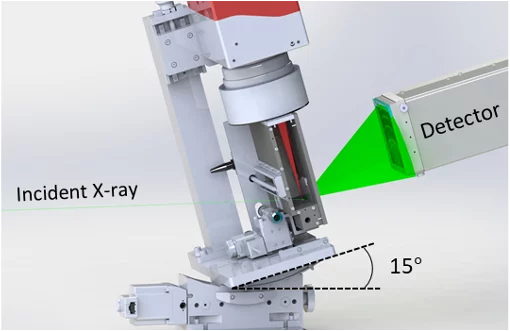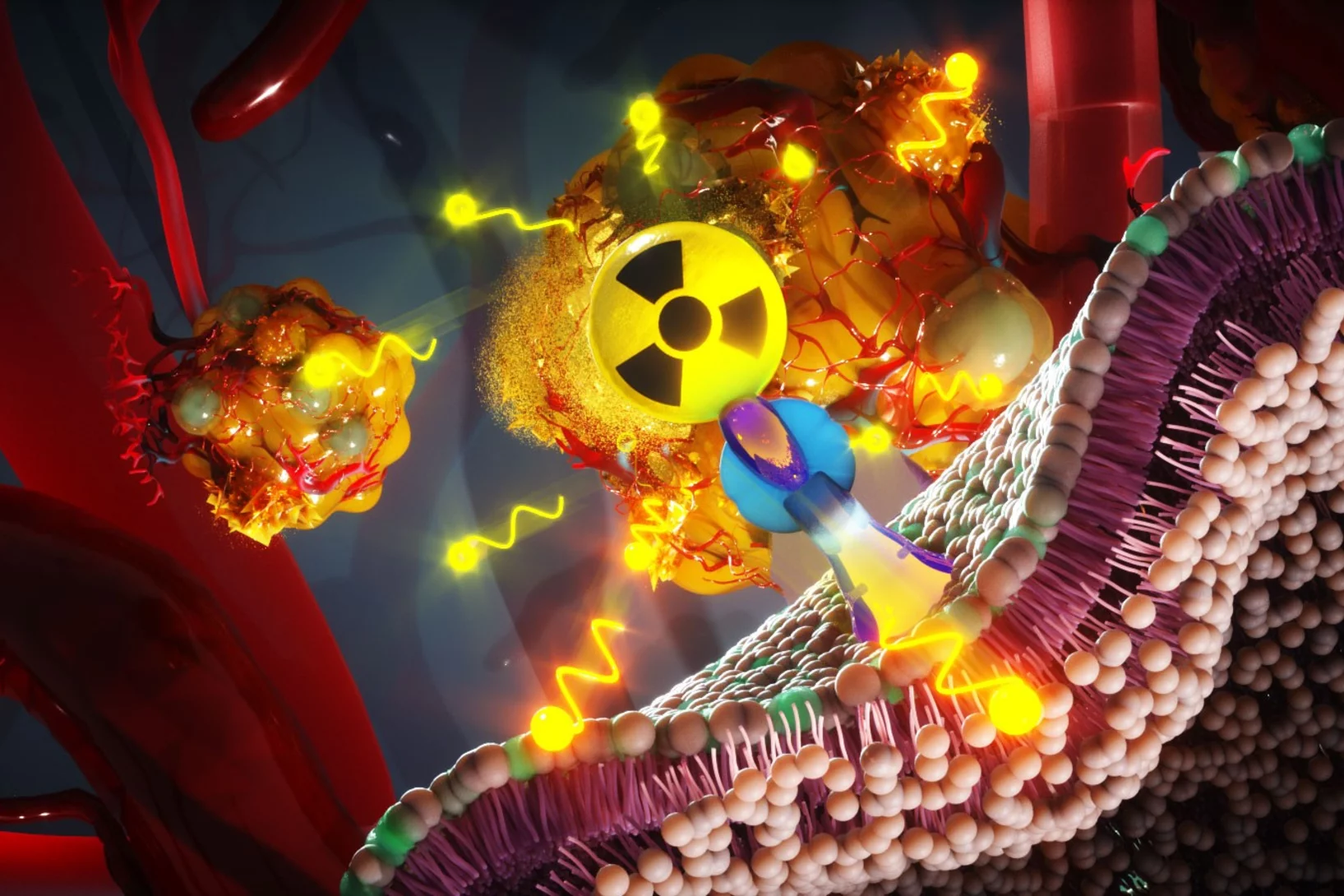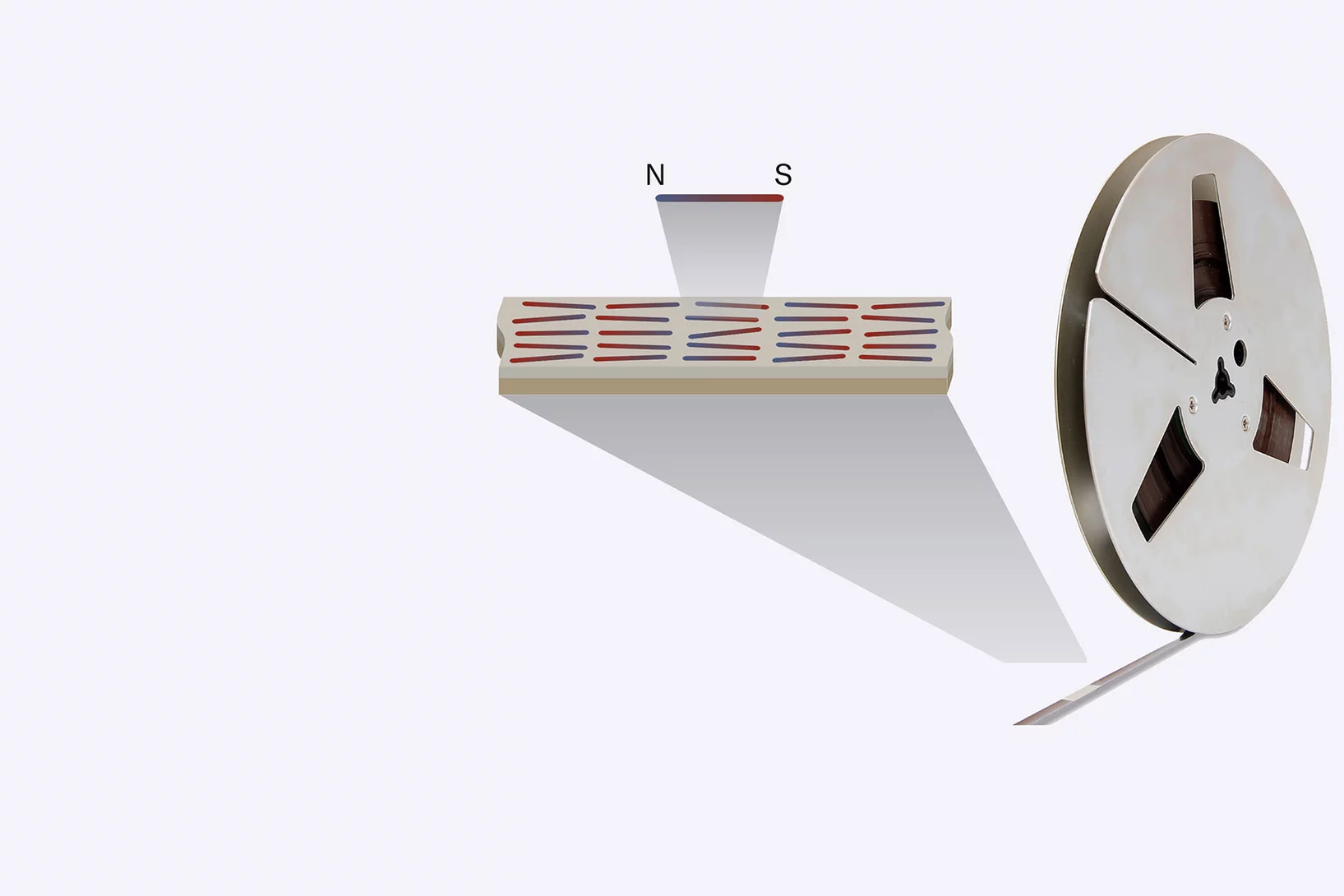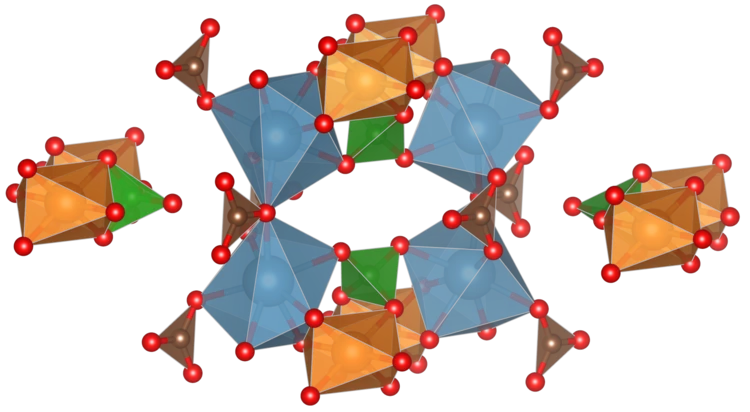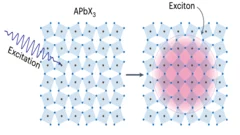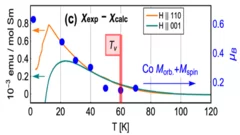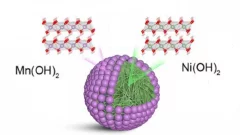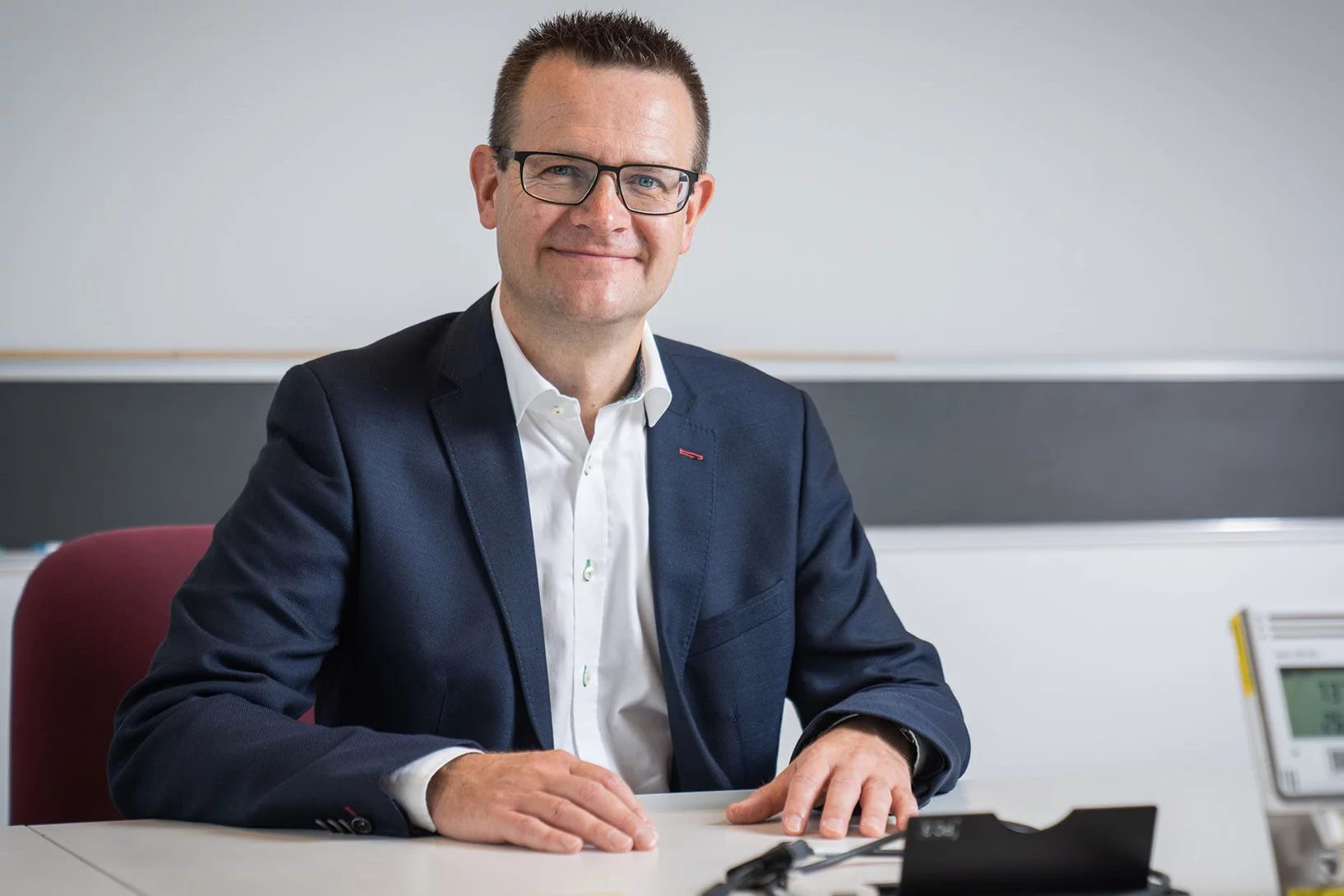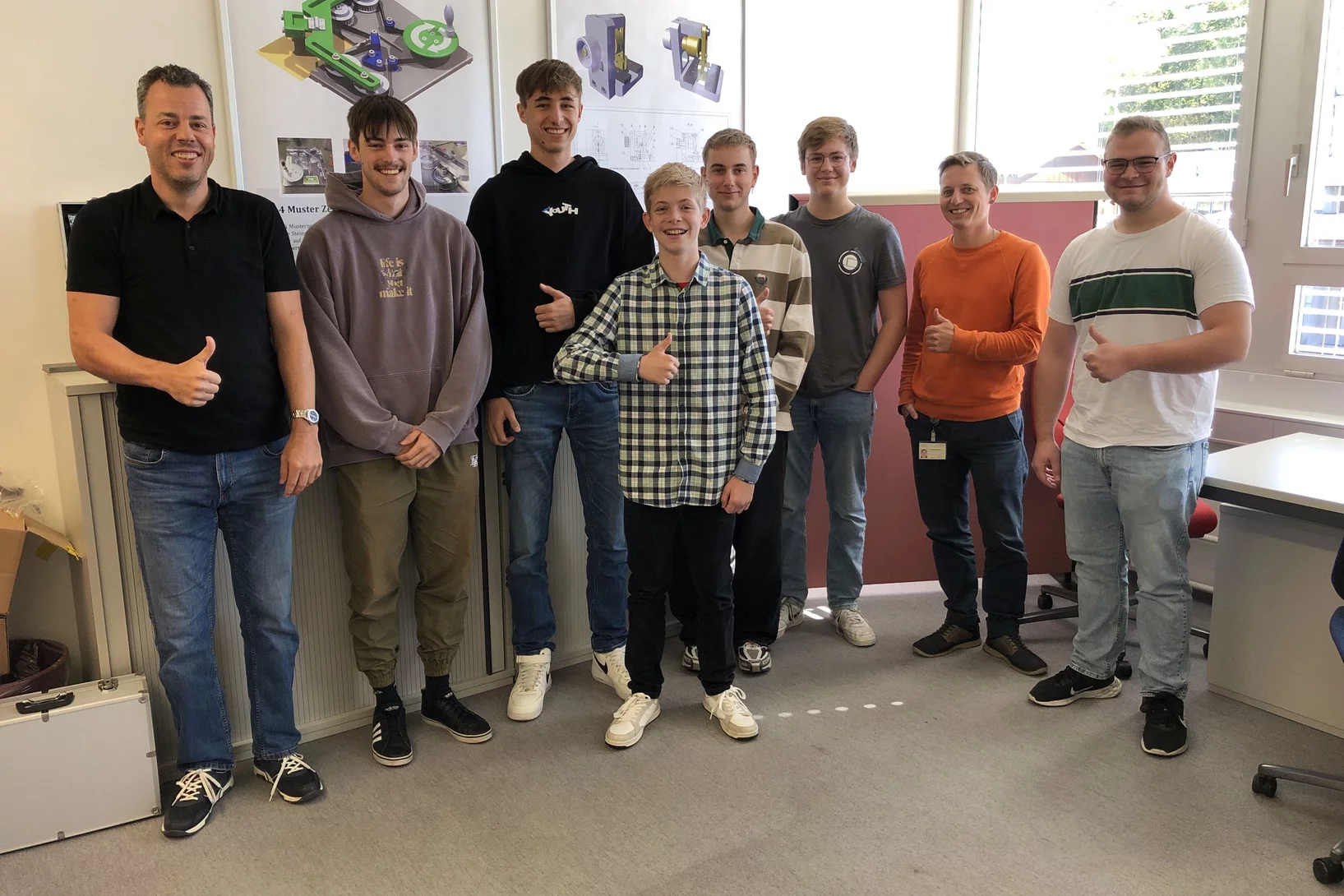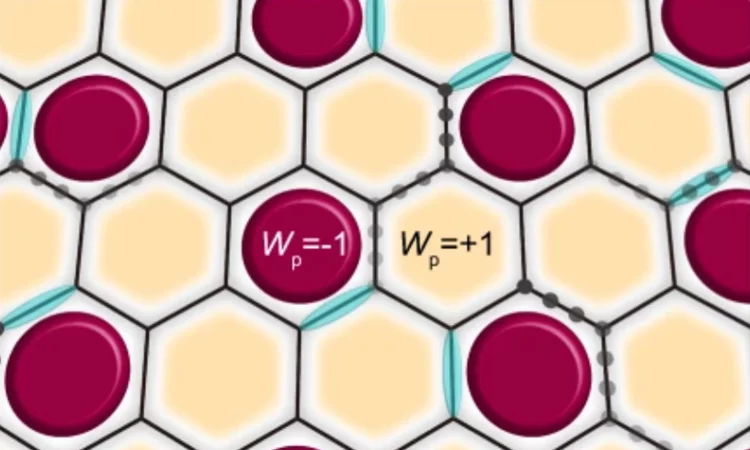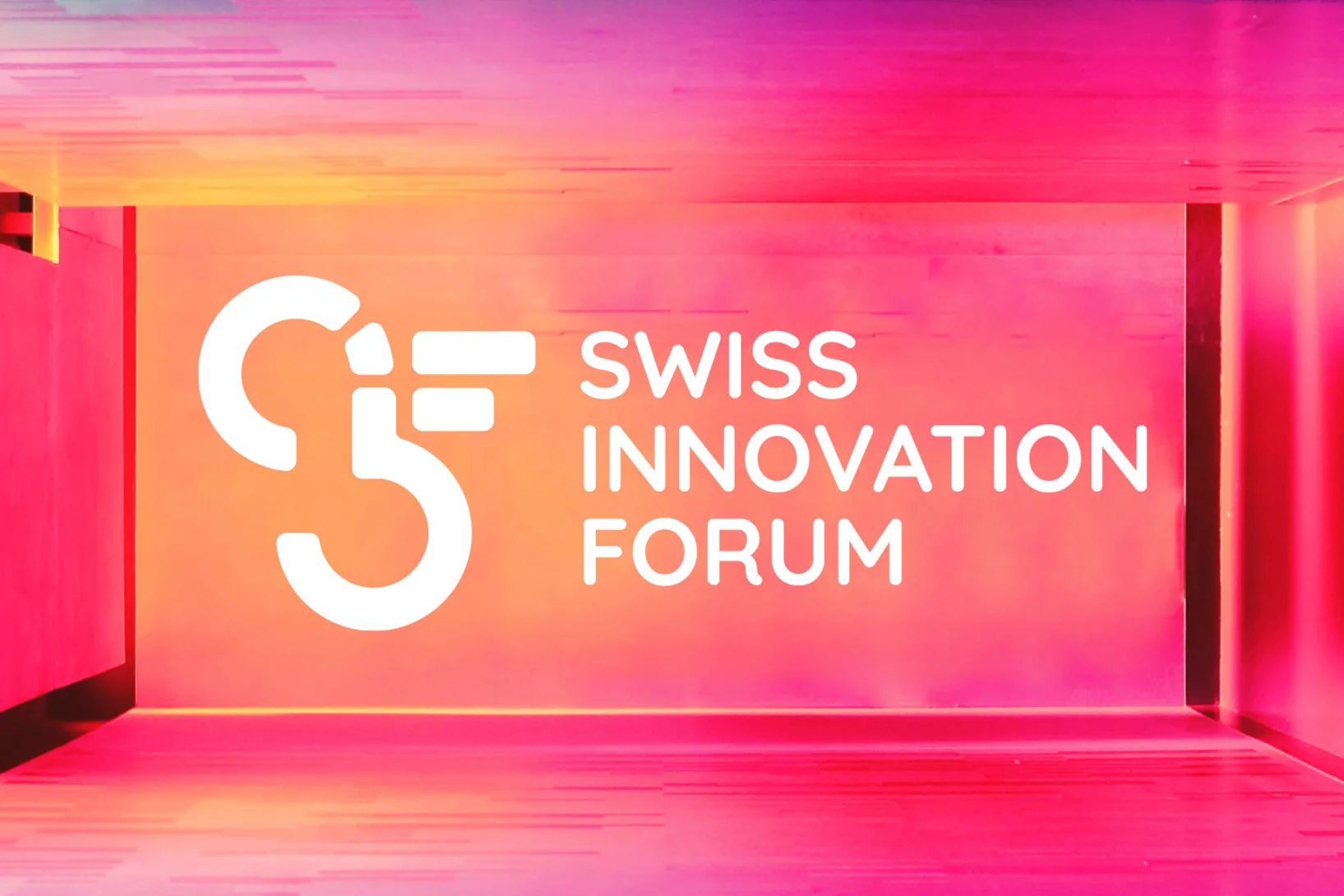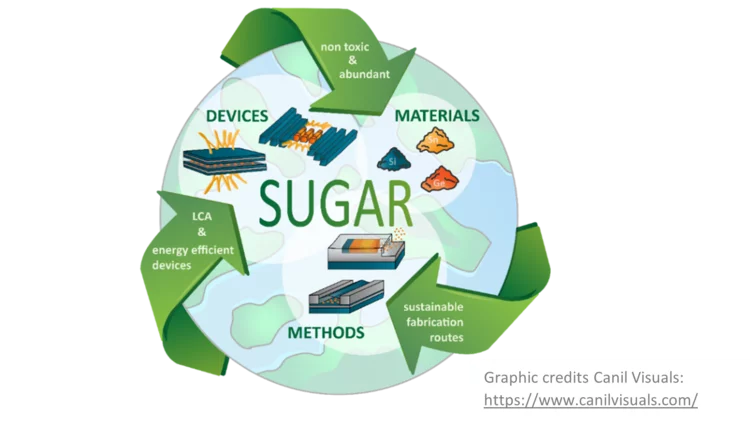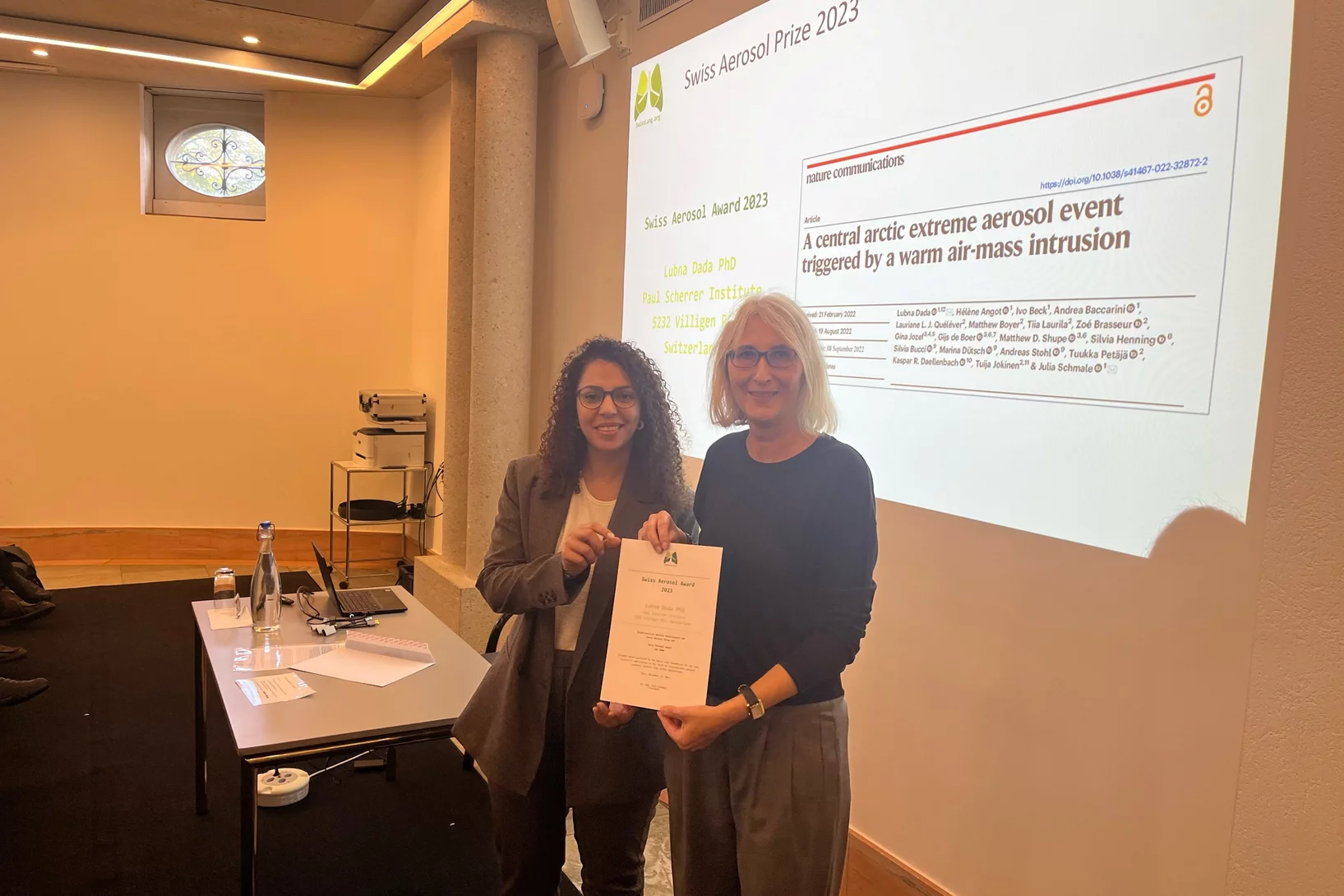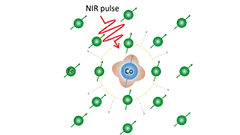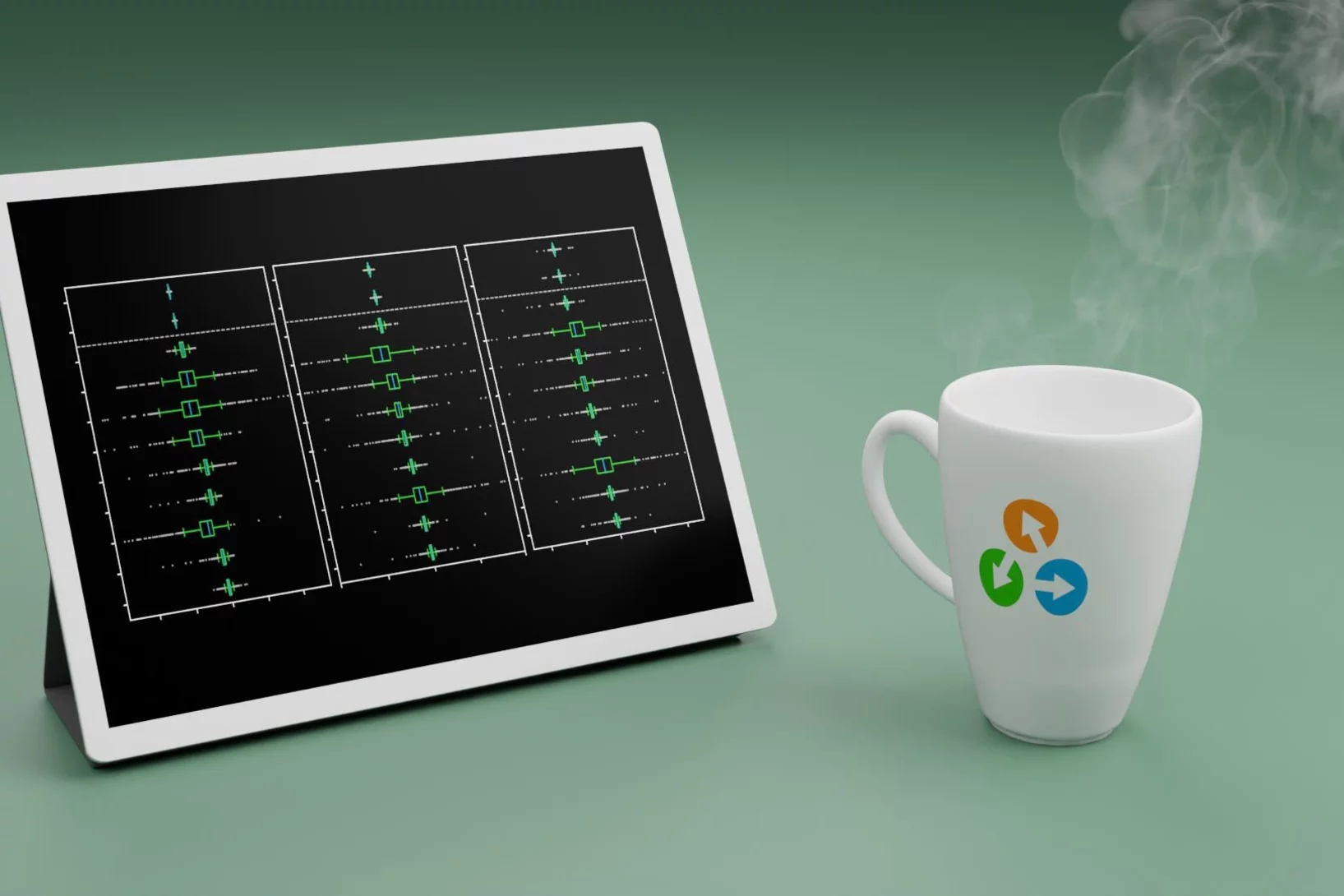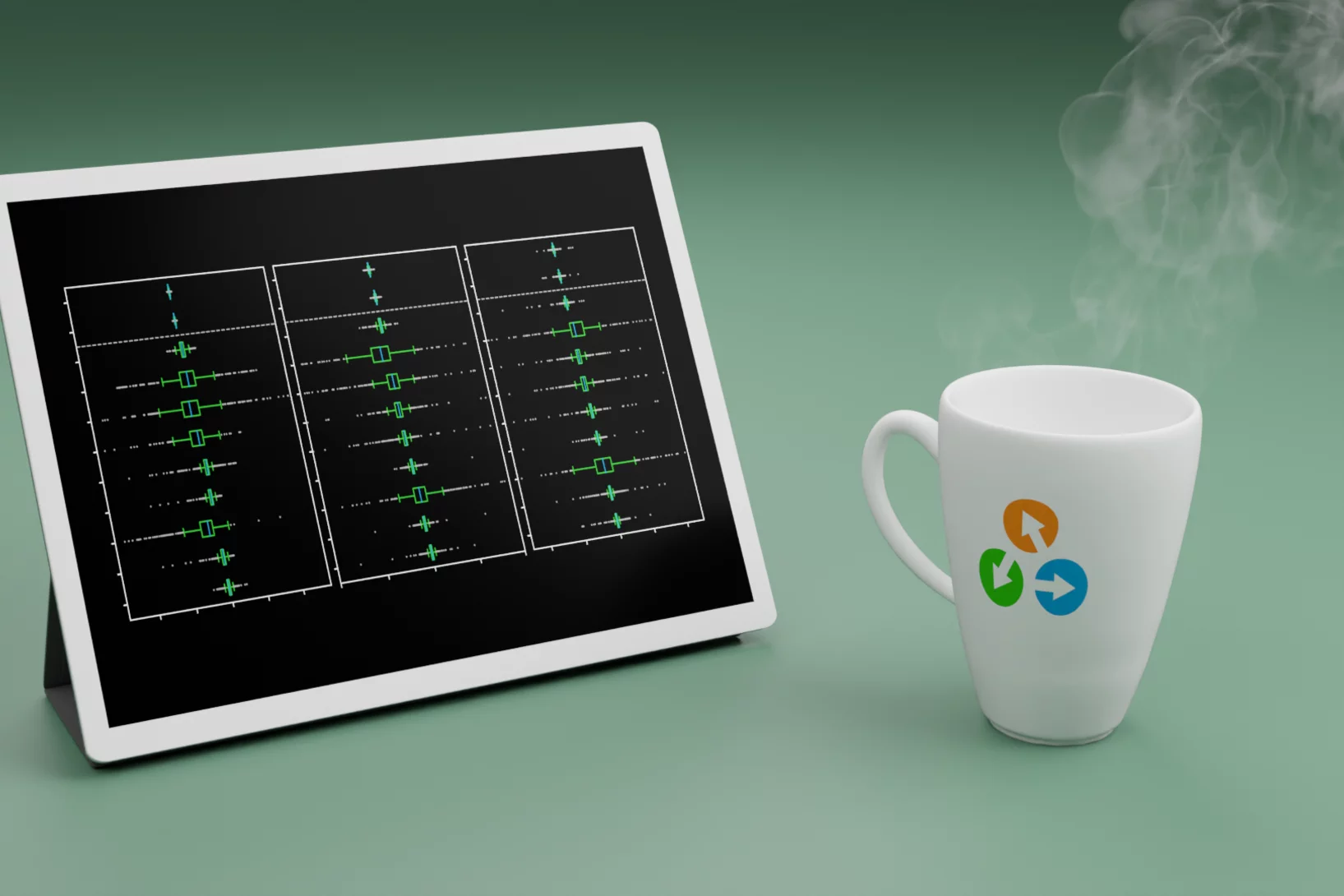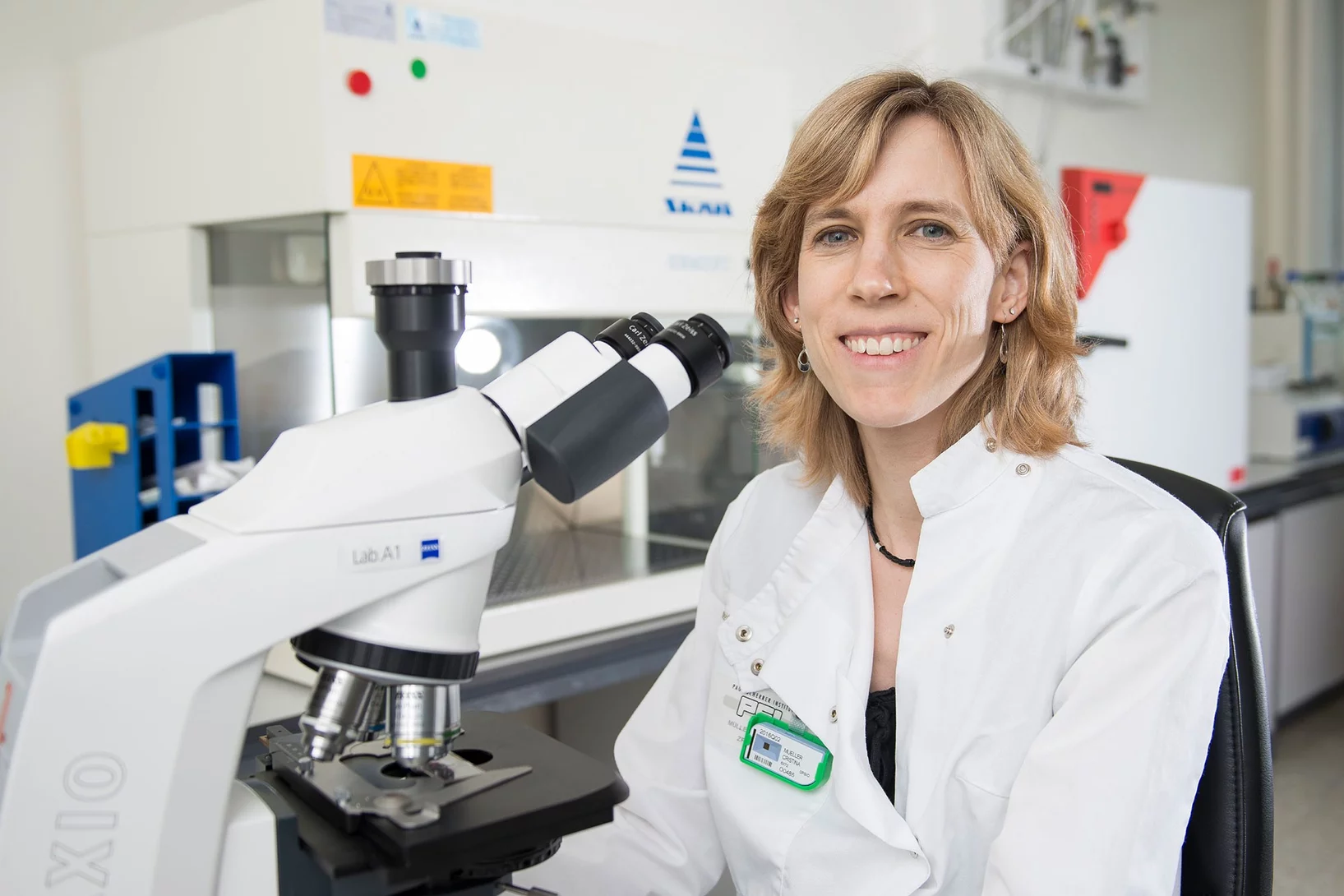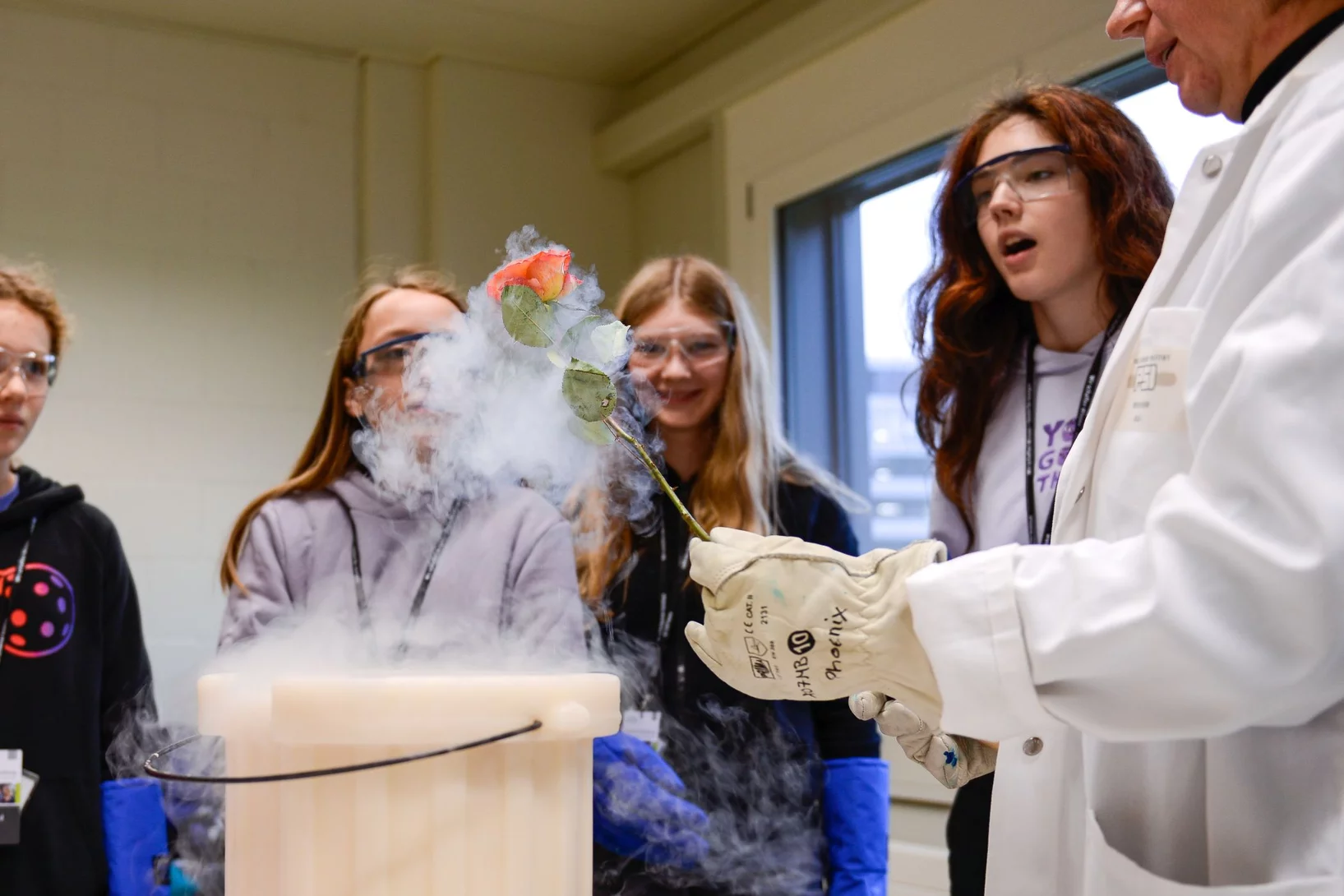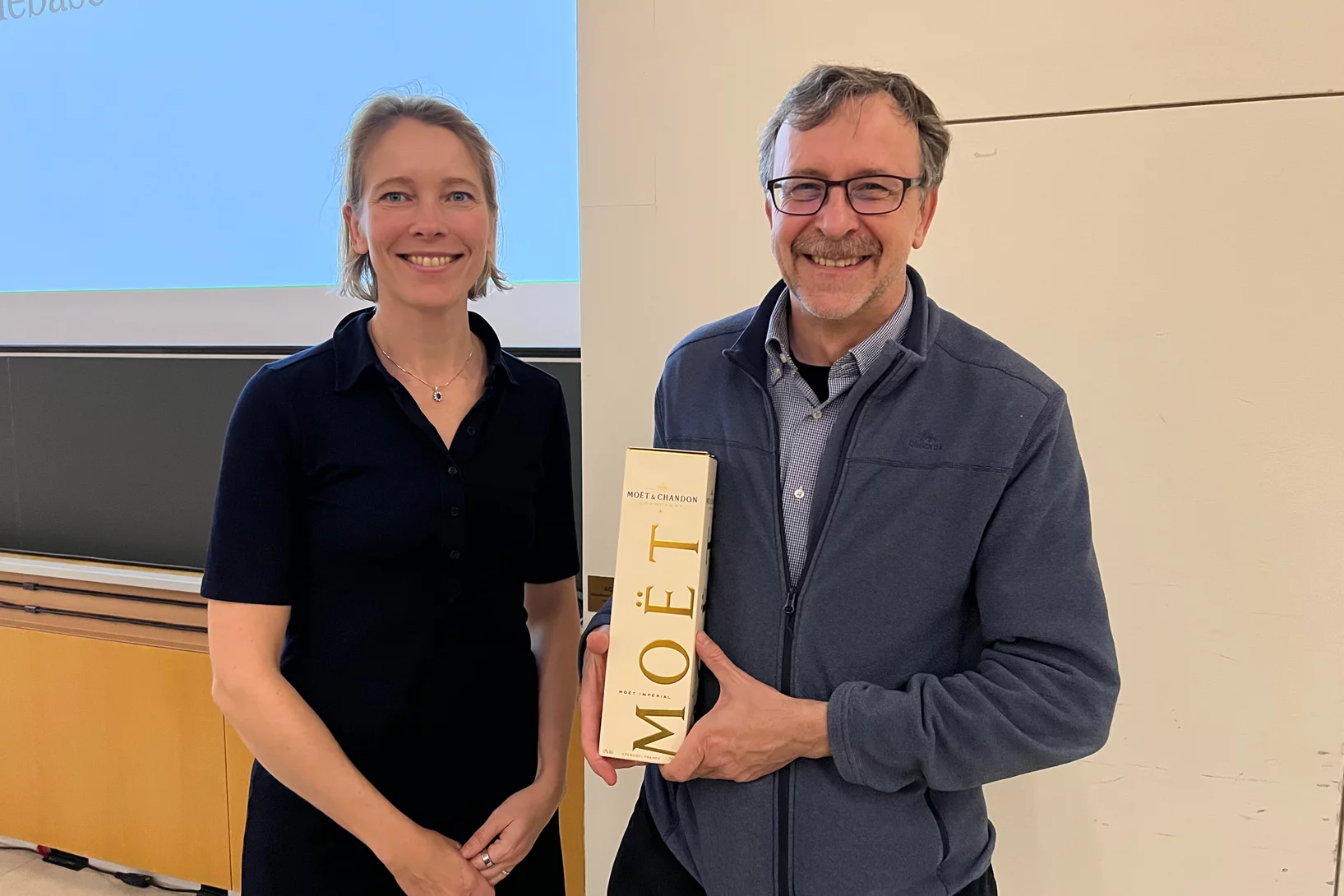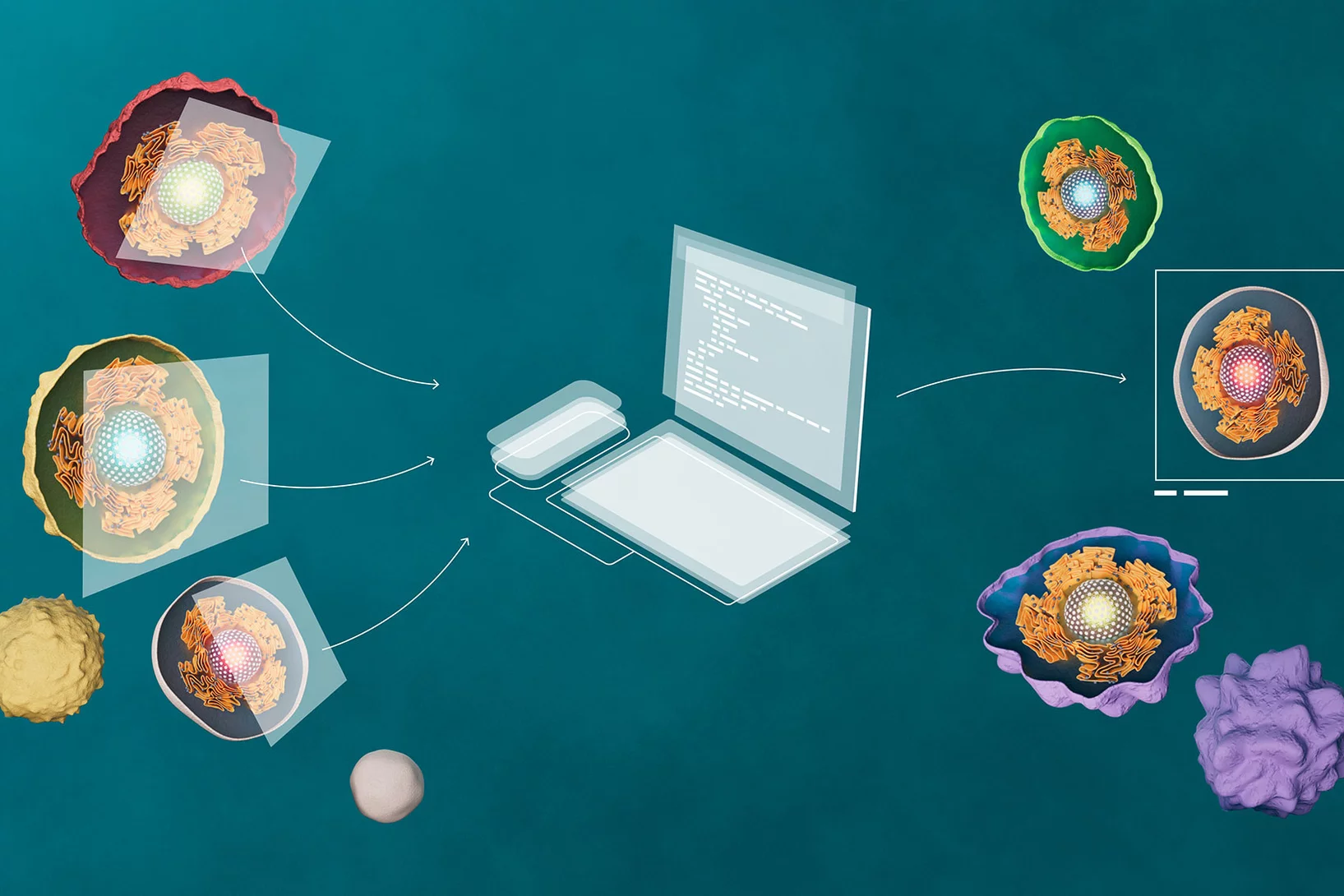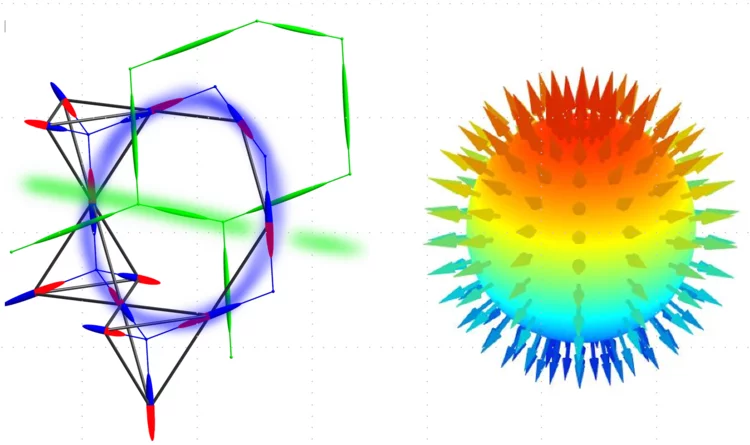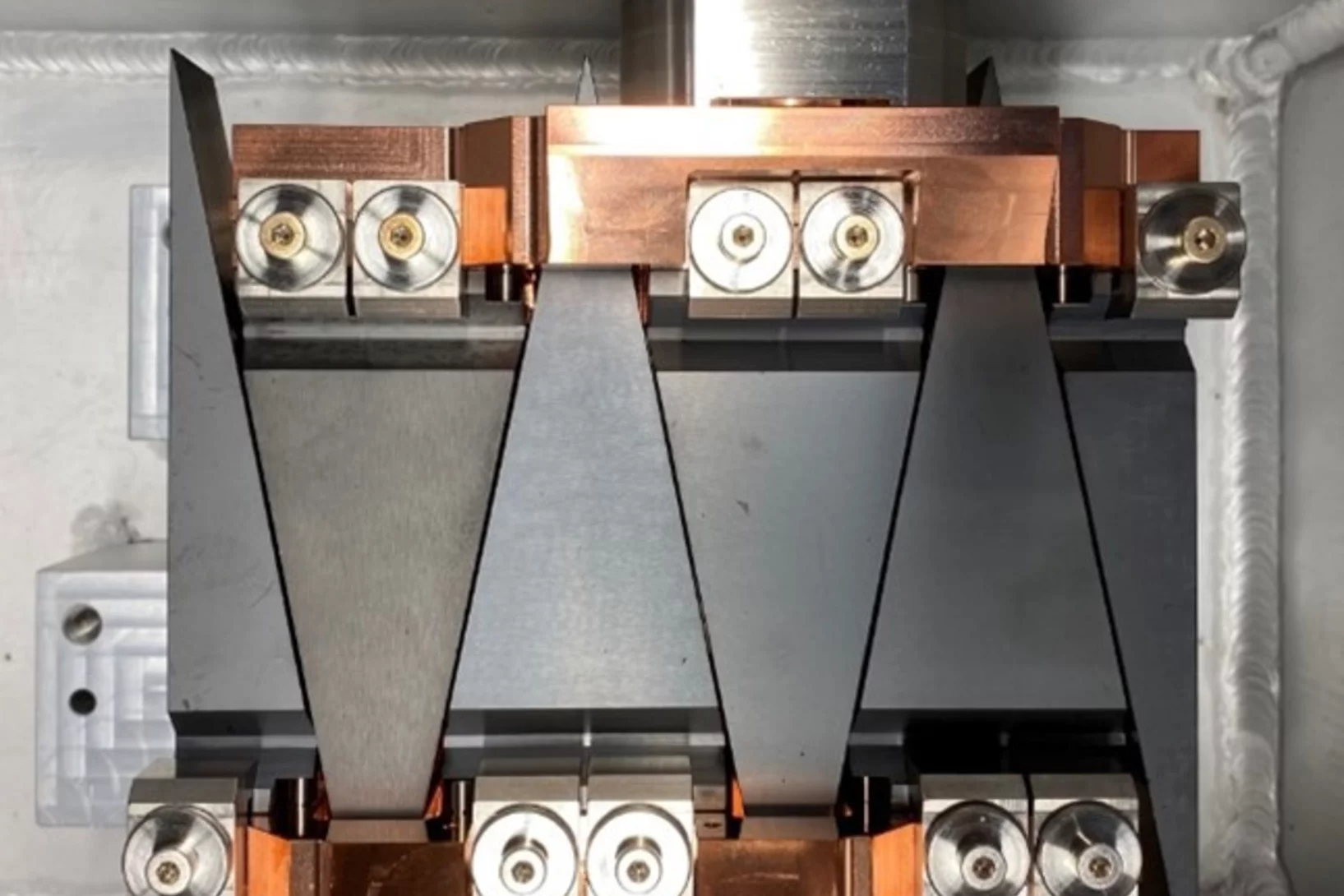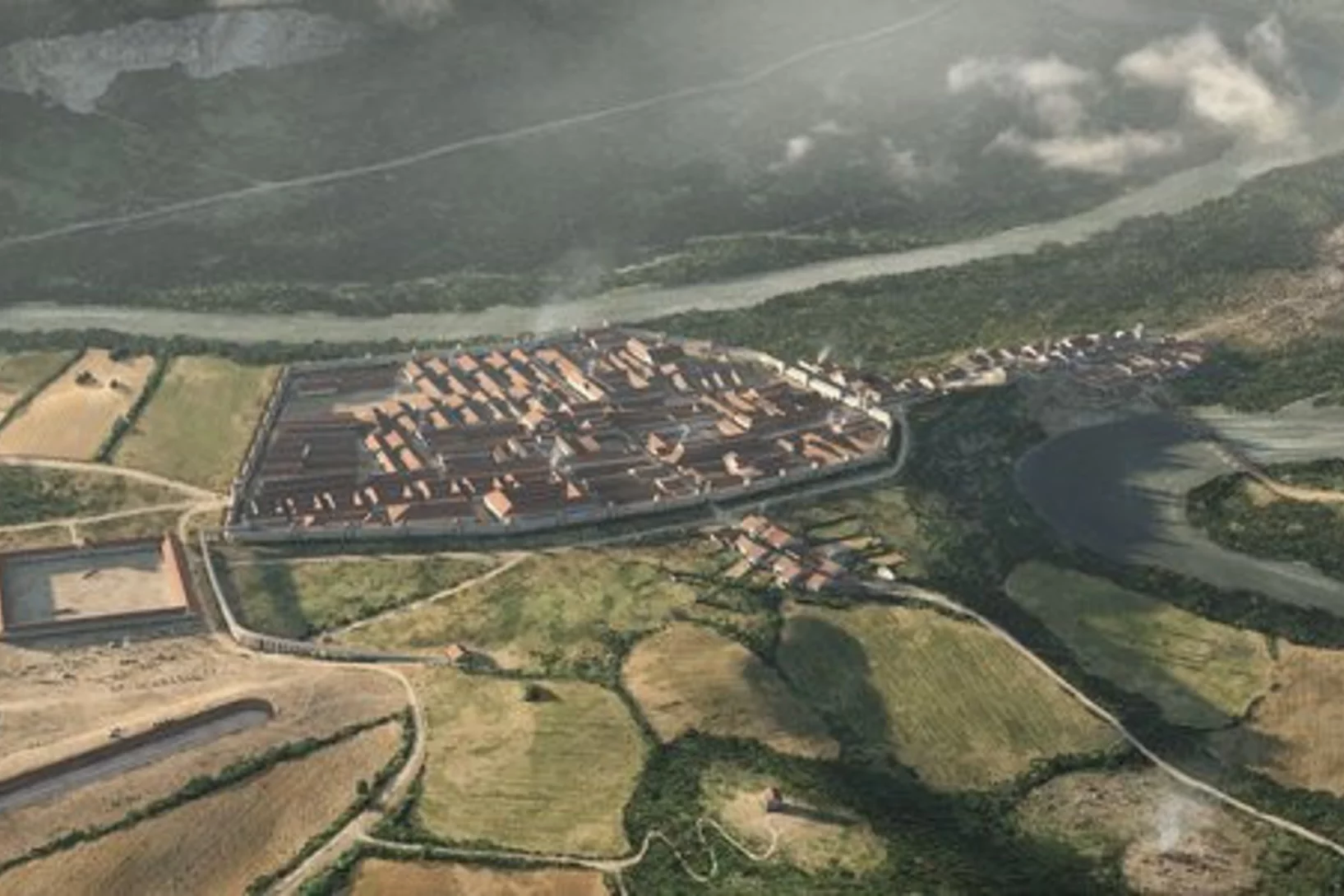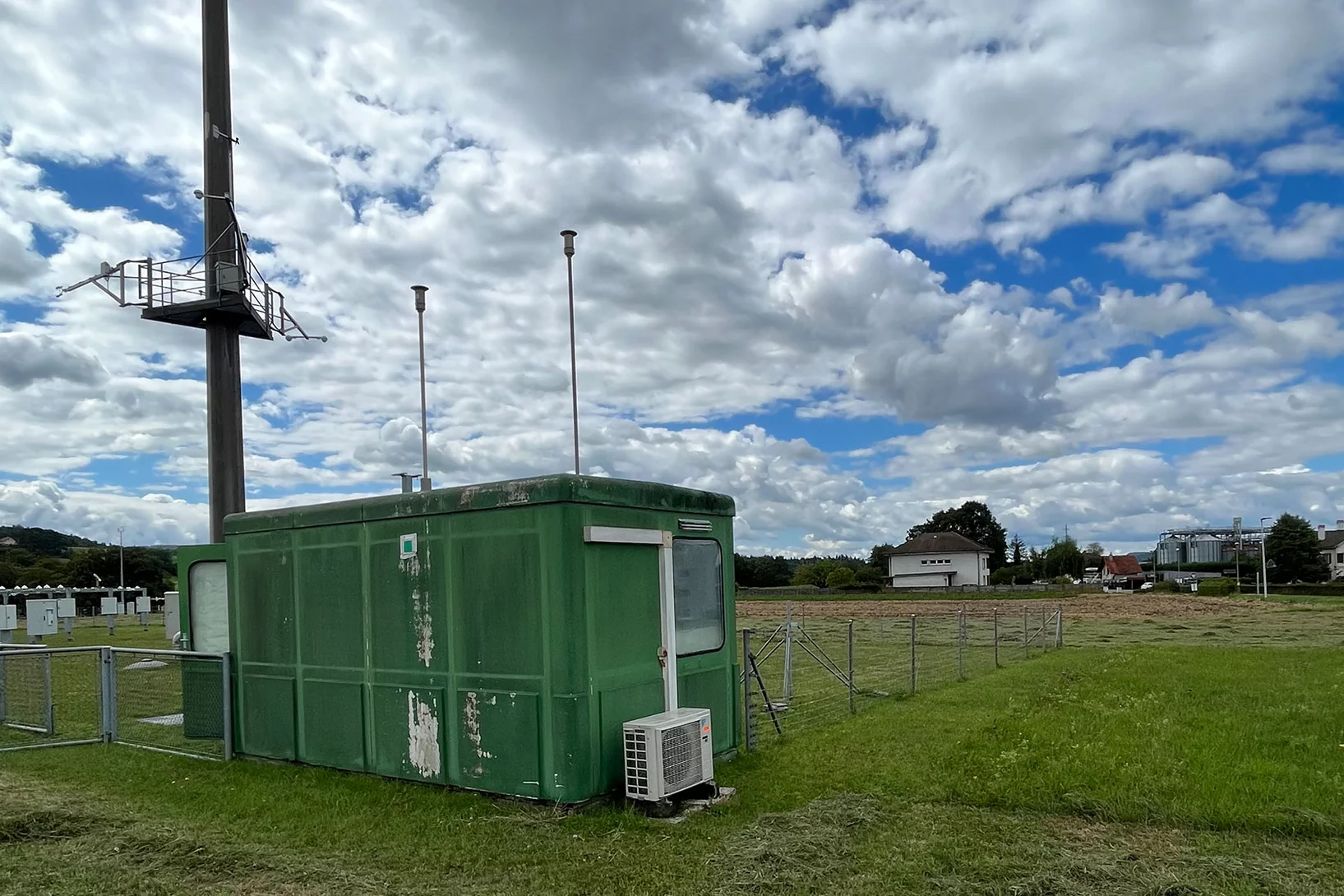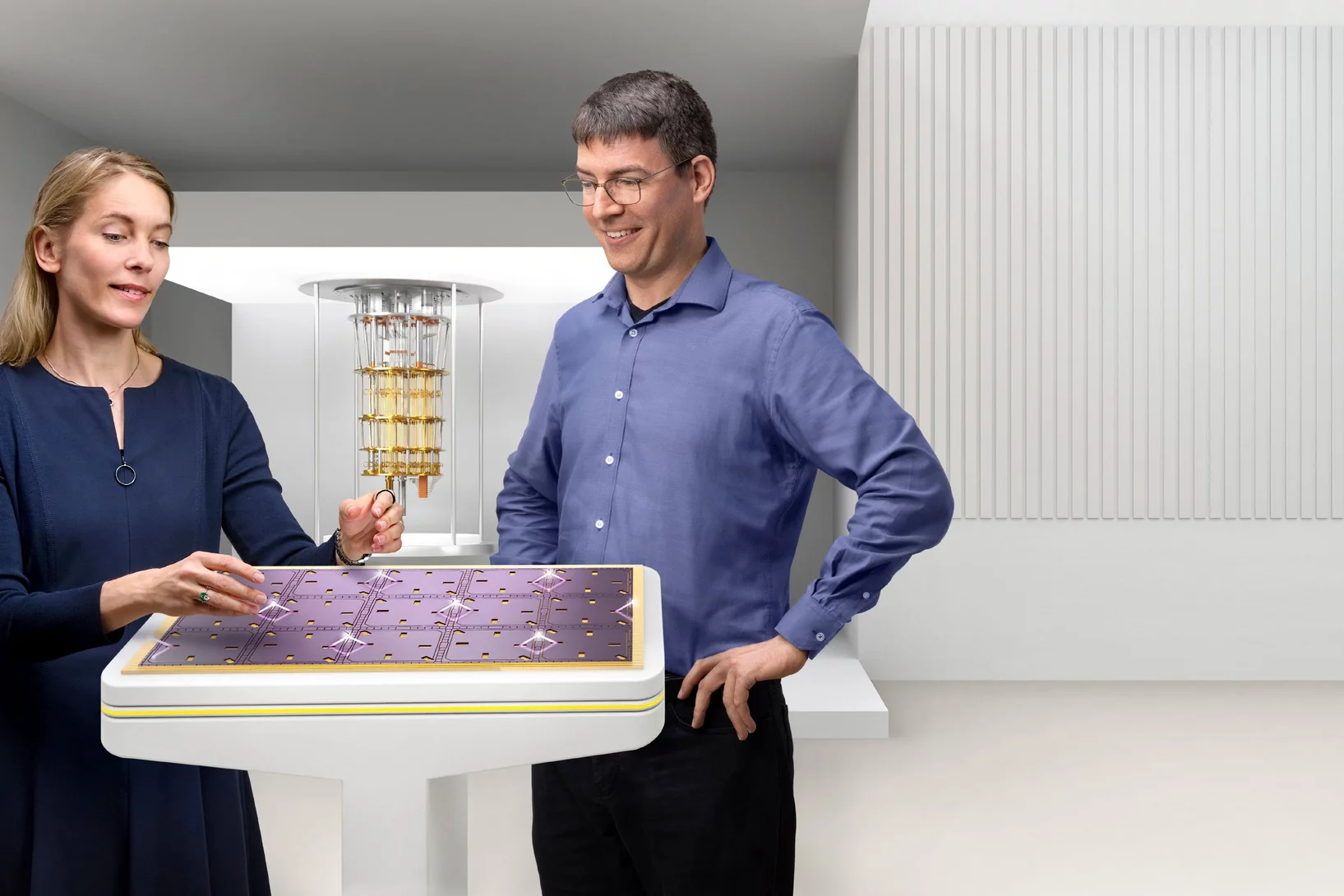Shifting away from nuclear energy, expanding solar and wind power, generating energy from biomass, reducing energy consumption. Switzerland is committed to becoming climate-neutral by 2050. An ambitious goal, which has become more urgent than ever due to the increasingly challenging geopolitical situation. How can a sustainable and resilient energy supply for Switzerland be established over the coming years? What's the optimal way to use renewable energy sources? What new technologies are especially promising? At PSI, researchers are seeking answers to these crucial questions.
Reprogramming tissue mechanically
Scientists at PSI have used mechanical stimuli to turn connective tissue cells into stem-cell-like cells and transplanted these into damaged skin tissue. This speeds up the regeneration of the skin and the healing of wounds.
The secret life of an electromagnon
SwissFEL sheds light on how lattice and atomic spins jiggle together.
Konstrukteure besuchen den Kontrollraum des PSI
Die totale Überwachung des PSI?
Hidden magnetism uncovered in a charge ordered bilayer kagome material ScV6Sn6
Charge ordered kagome lattices have been demonstrated to be intriguing platforms for studying the intertwining of topology, correlation, and magnetism. The recently discovered charge ordered kagome material ScV6Sn6 does not feature a magnetic groundstate or excitations, thus it is often regarded as a conventional paramagnet. Here, using advanced muon-spin rotation spectroscopy, we uncover an unexpected hidden magnetism of the charge order. We observe an enhancement ...
Microstructural control of additively manufactured Ti-6Al-4V
In-situ Selective Laser Heat treatment is applied to induce martensite decomposition in Ti-6Al-4V
Terbium-161: new radionuclide therapy hits the clinic
Highly targeted cancer treatment has the potential to eliminate ultra-small cancer lesions that cause disease recurrence.
Smart glass and music from SLS
Every year the PSI Founder Fellowship Programme supports new ideas for innovative applications with up to 150,000 Swiss francs.
New post-doc position on high-throughput discovery in the MSD group
A new post-doc opportunity is open to join the MSD group to set up and maintain large scale materials discovery projects based on the workflow engine AiiDA.
These positions are funded by NCCR MARVEL, offering close collaboration opportunities with project partners such as the Swiss Supercomputer Center CSCS, and other institutions in Switzerland and Europe.
Deadline: December 10, 2023
Excitons coupling to octahedral tilts in Pb nano-perovskites
Excitons coupling to octahedral tilts in Pb nano-perovskites
Crystal field rules heavy fermion delocalization in SmCoIn5
Crystal field rules heavy fermion delocalization
"Core-shell" cathodes for high performance Li-ion batteries
“Li-rich Ni-rich” core-shell particles are engineered as layered cathode materials for high energy Li-Ion batteries, including a controllable outer "Li-rich Mn-rich" shell improving cyclability.
How important is hydrogen for the energy transition?
Assessments by PSI energy expert Thomas J. Schmidt
Zwei spannende und erfolgreiche Tage am PSI
Zu Besuch bei Konstrukteur- und Polymechanik-Lernenden an den Besuchserkundungstagen der Schule Endingen
Kondo screening in a Majorana metal
Kondo impurities provide a nontrivial probe to unravel the character of the excitations of a quantum spin liquid. In the S = 1/2 Kitaev model on the honeycomb lattice, Kondo impurities embedded in the spin-liquid host can be screened by itinerant Majorana fermions via gauge-flux binding. Here, we report experimental signatures of metallic-like Kondo screening at intermediate temperatures in the Kitaev honeycomb material α-RuCl3 with dilute Cr3+ (S = 3/2) impurities.
PSI at the this year's Swiss Innovation Forum!
Networking and exchange, inspiration and new ways of thinking can make an important contribution to innovation. That’s why we as PSI support the this year’s edition of the Swiss Innovation Forum (SIF) 2023 in Basel as a partner.
On 30 November, motivated start-ups, committed investors and courageous idea generators meet at the Congress Centre Basel. In a cross-sector exchange, they develop new ideas to drive the Swiss innovation landscape forward.
Highlights of the programme:
💡 Keynotes by Catrin Hinkel (CEO, Microsoft Schweiz), Jürgen Geuter (Tech De-Evangelist & Co-Founder, Otherwise Network), Prof. Dr. Gregor Hasler (Professor, Chefarzt, Universität Freiburg und Freiburger Netzwerk für Psychische Gesundheit (Schweiz)) and many more.
💡 Presentation of the Swiss Technology Award 2023, the most important technology prize in Switzerland.
💡 Experience Zone with exciting cases from Switzerland as a country of innovation.
PSI will be there: Together with ETH Zurich, we will be presenting the exciting topic of "Quantum Computing" at our stand at FutureExpo this year! Looking forward to meeting you there!
Detailed information and registration for the conference at www.swiss-innovation.com/en/
Sustainable Group-IV Active Photonics Research Sinergia Project granted
We are excited to announce that our joint Sinergia Project: Sustainable Group-IV Active Photonics Research (SUGAR) has been approved for funding by the SNSF and will start in the spring of 2024. SUGAR is an interdisciplinary project that aims to develop a more sustainable photonics platform, based on group IV elements (Si, Ge, Sn). The proposal emphasizes sustainability throughout the entire device life-cycle, incorporating life cycle assessment (LCA) from extraction to end-of-life.
Lubna Dada wins Swiss Aerosol Award 2023!
Dr. Lubna Dada, scientist at the Laboratory of Atmospheric Chemistry, at Paul Scherrer Institute received the Swiss Aerosol Award 2023 from the Swiss Lung Foundation in Bern for her excellent work on warm airmass intrusions from mid-latitudes into the Arctic.
Mechanism For All-Optical Magnetization Switching
X-rays reveal a non-collinear magnetic state as the base for all-optical magnetization switching.
New Nat. Rev. Phys. publication: A “gold standard” for computational materials science codes
A large consortium of scientists, coordinated by PSI researchers in the LMS laboratory, led the most comprehensive verification effort so far on computer codes for materials simulations, providing their colleagues with a reference dataset and a set of guidelines for assessing and improving existing and future codes.
A gold standard for computational materials science codes
The most comprehensive verification effort so far on computer codes for materials simulations.
Development of a Radioligand
Cristina Müller and her team are looking for a new means of visualising and further investigating the SARS-CoV-2 entry receptor using PET imaging techniques.
Nationaler Zukunftstag 2023
113 Kinder erkunden spannende Berufswelten
Park Innovaare Cleanroom Name is: PICO
We are happy to announce that the new Cleanroom Name in the Park Innovaare will be PICO = Park Innovaare Cleanroom for Optics and innovation.
Next Step – we will work on a Logo (ideas welcome), together with PiA.
The winner of the naming contest: Helmut Schift
How artificial intelligence would have written my motivation letter
How can we use artificial intelligence in the application process? I gave it a try and had artificial intelligence write a motivation letter for my current position with the information that I am a physicist and a coach. Here is what came back (interestingly, the content and structure are different when asking in English vs German, so it is worth to read both translations):
Grasping diseases by the roots
PSI researchers take pictures of cell nuclei using modern high-resolution imaging techniques, employ learning algorithms to comb through these data, and thus can more reliably identify anomalies.
SNSF funds new LNS projects on quantum materials for 1.75 million
Scientists working on exotic magnetism at the Laboratory for Neutron Scattering and Imaging (LNS) are to receive two project fundings from the Swiss National Science Foundation (SNSF), amounting to 1.75 million Swiss francs.
A more efficient degrader for proton therapy
At PSI’s Center for Proton Therapy (CPT), protons are used to treat cancerous tumours in a highly targeted way that spares healthy tissue as much as possible. This is the result of the characteristic way in which charged particles interact with matter, so that a beam of protons deposits most of its energy at a certain depth in a material depending on the energy and the composition of the material. The dedicated medical cyclotron COMET accelerates protons to an energy of 250 MeV, which then have to be "slowed down" so that the energy matches the depth of the tumour to be treated.
Berufsbildnerabend 2023
Eine Reise in die Römerzeit
New Study Reveals Surprising Climate Benefits of Agriculture
The big challenges our planet faces—like climate change, food supply, water, and biodiversity—are all interlinked. While agriculture continues to be the primary source of food for human kind, it imposes climate challenges especially through emissions like greenhouse gases and ammonia. To solve this, we need a new approach that reduces the harmful effects of farming on the climate.
Two projects launched to connect error-corrected qubits
Researchers at ETH Zurich and PSI are participating in two quantum computing projects that are being financed by the US research funding agency IARPA.

